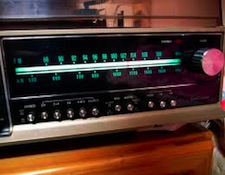It’s the time of year for saving money!

Every hobby has its share of jargon. Audiophilia carries this to its usual logical uber-extreme. Gordon Holt wrote an entire glossary of audio terms, which he intended to rewrite near the end of his life, but copyright prohibitions prevented that from happening.
One phrase that’s not in J. Gordon’s glossary is mid-fi. Audiogon has a message chain that displays all the standard audiophile purgative put-downs of mid-fi owners including these from “Elizabeth,” “You might own a mid fi system if your house has only two rooms, and a DELUXE model outhouse. (two seats, no waiting). You might own a mid fi system if your idea of a financial retirement plan is to bury a hundred bucks in your backyard. You might own a mid fi system if your wife moonlights at the local greasy spoon truck stop.” Many of the other comments displayed an equal amount of what I’ll call “cultural bias” and were even less complementary of those who would own mid-fi gear.
My own take on “mid-fi” is very different. I think that the sonic quality levels that used to be called “mid-fi” and the price-points that used to designate mid-fi are almost as old and moldy as the put-downs on that Audiogon message string. I think that audiophiles and perhaps more importantly, potential future audiophiles, can find plenty of gear in what used to be mid-fi prices that will give the high-priced stuff, especially older digital high-end stuff, some serious sonic competition. I’d take a King Rex 384/24 USB DAC over any USB DAC that’s over four years old. I’d also take a Sonic T-Amp over most solid-state integrated amplifiers that are more than ten years old regardless of their original price.
So are there still mid-fi products? Not in my world – there’s only low fi, such as iPod docks with built-in speakers, and hi-fi, which nowadays is almost any audio component designed to go into a full-range system.
And please don’t misunderstand me, I’m not saying that ALL low-priced performance-oriented products and companies make better products than specialist Hi-Fi firms did ten years ago, but I am saying that for the average audio consumer the chances of winding up with mid-fi sonics is far less likely than it used to be, and that is a very good thing…





